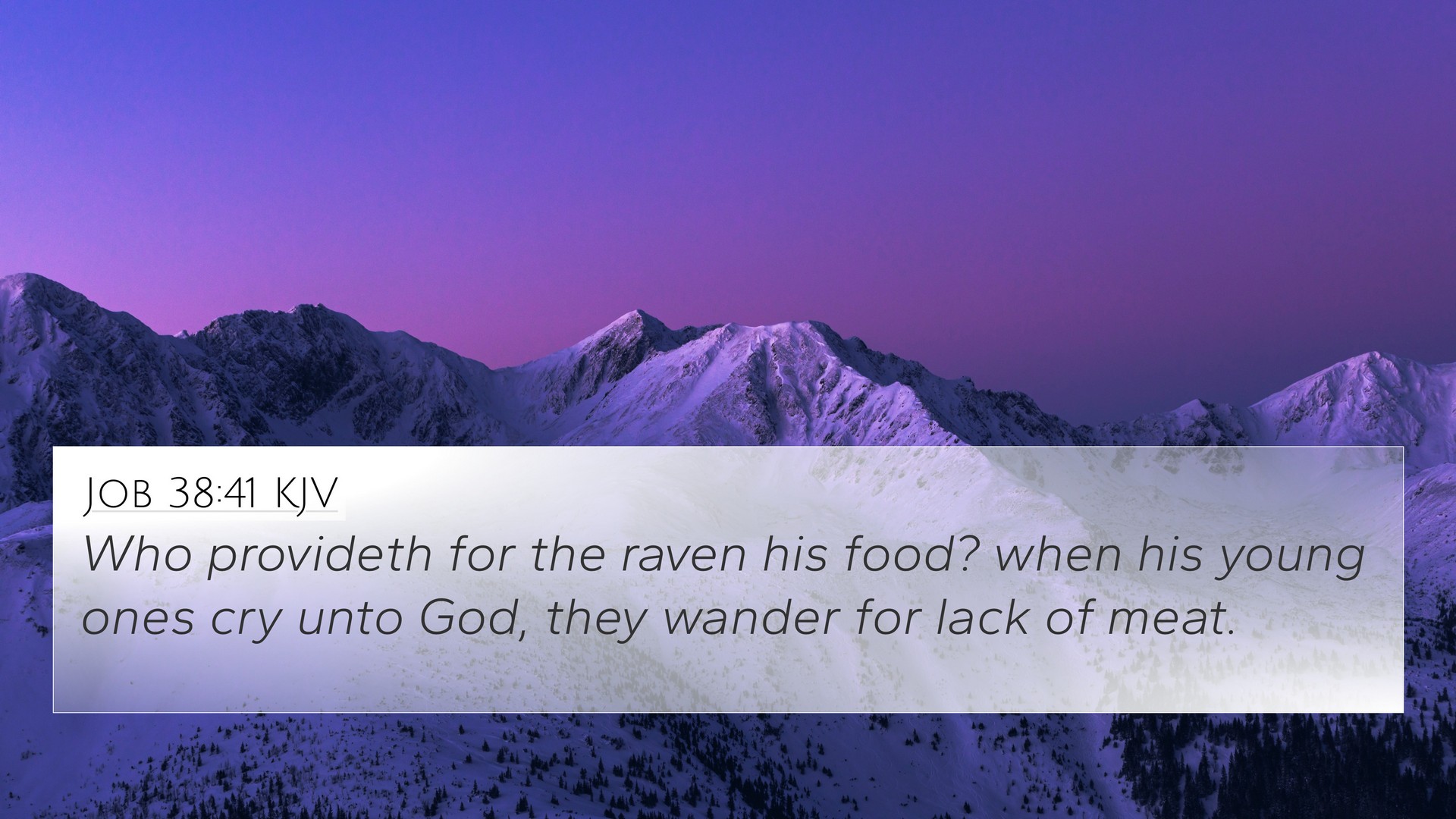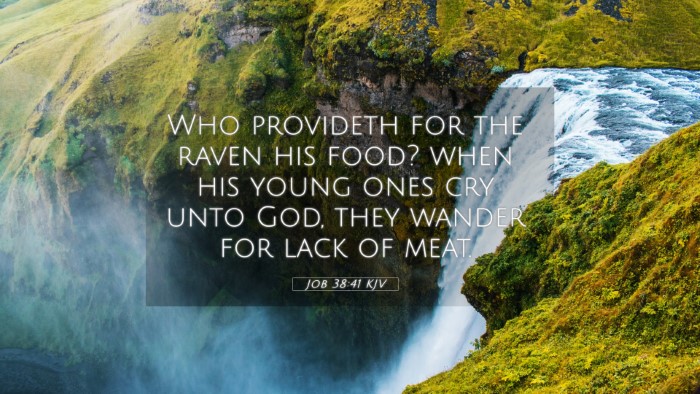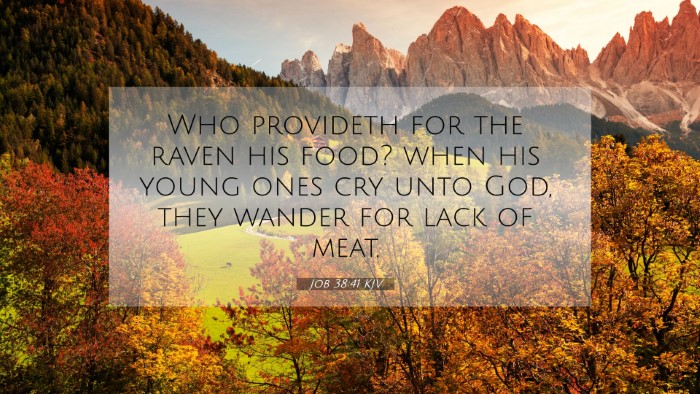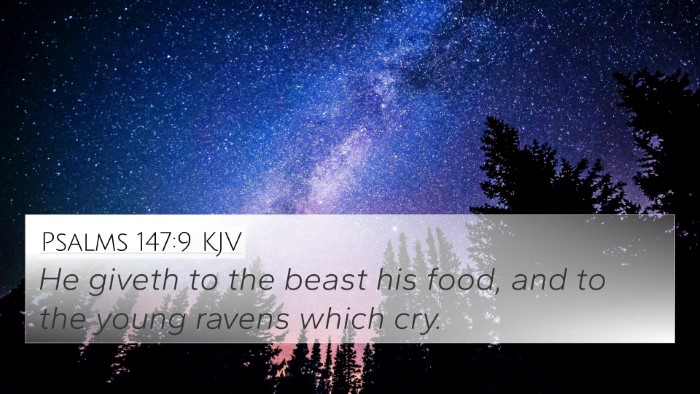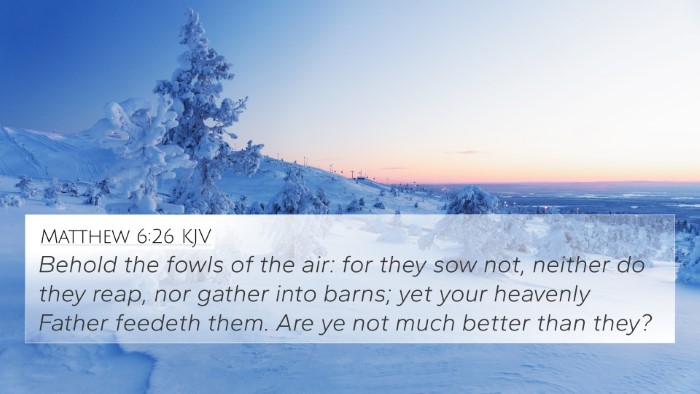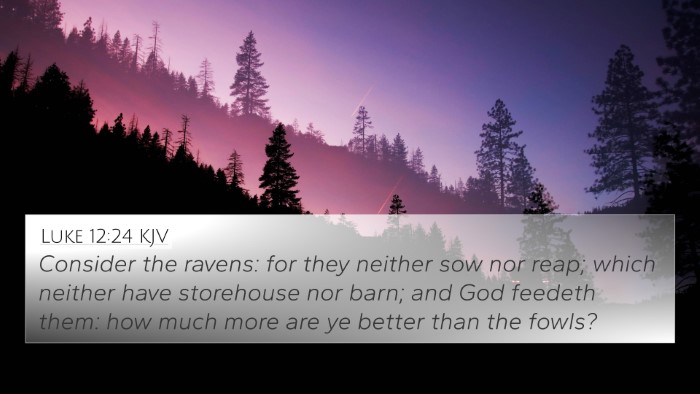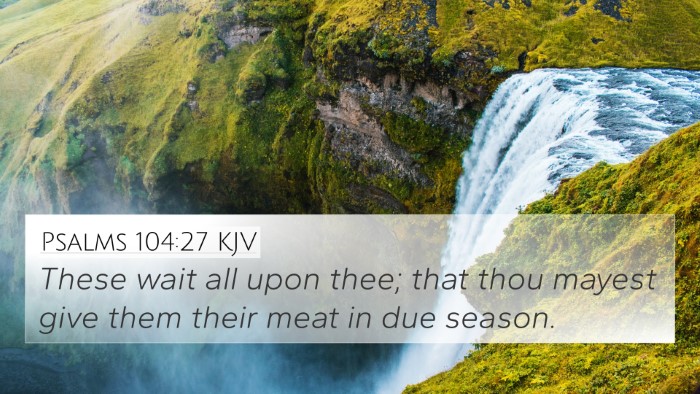Understanding Job 38:41
Job 38:41 states: "Who provides for the raven its prey, when its young ones cry to God, and wander about for lack of food?" This verse is part of a larger passage in which God responds to Job, emphasizing His sovereignty over creation and His provision for even the most seemingly insignificant creatures.
Summary of Insights from Public Domain Commentaries
In this verse, God prompts Job to consider His wisdom and care in providing for all creation, including the raven. The ravens, often viewed as unclean and unworthy birds, are a testament to God's providence. Through this inquiry, God reveals His attentive nature towards every living creature and highlights a fundamental characteristic of His divine governance.
Matthew Henry's Commentary
Matthew Henry emphasizes that God's care extends to all creatures, regardless of their status. He notes that the raven is often associated with desolation, yet God does not overlook their needs. This highlights God's accessibility and concern for even the lowliest of His creation.
Albert Barnes' Notes
Albert Barnes points out that the question implies God's omniscience and omnipotence, reflecting on how He knows the needs of all His creatures, even before they cry out. This indicates a deep care that is not limited to humans but encompasses all of nature.
Adam Clarke's Commentary
Adam Clarke adds that the verse illustrates the natural instincts God has given to animals, allowing them to cry out when they are in need. The providence of God is shown in His providing even for birds and beasts, affirming the interconnectedness of life and the dependency of creation on the Creator.
Connections and Cross-References
This verse can be linked to several other scriptures that further illuminate its meaning:
- Psalms 147:9 - "He gives to the beasts their food, and to the young ravens that cry."
- Luke 12:24 - "Consider the ravens: they neither sow nor reap, they have neither storehouse nor barn, and yet God feeds them. Of how much more value are you than the birds!"
- Matthew 6:26 - "Look at the birds of the air; they neither sow nor reap nor gather into barns, and yet your heavenly Father feeds them. Are you not of more value than they?"
- Job 39:41 - "Who provides for the raven its prey, when its young ones cry to God, and wander about for lack of food?"
- Isaiah 30:25 - "And on every lofty mountain and every high hill there will be brooks running with water, in the day of the great slaughter, when the towers fall."
- Genesis 1:30 - "And to every beast of the earth, and to every bird of the heavens, and to everything that creeps on the earth, everything that has the breath of life, I have given every green plant for food. And it was so."
- Exodus 16:12 - "I have heard the grumbling of the people of Israel. Say to them, 'At twilight you shall eat meat, and in the morning you shall be filled with bread. Then you shall know that I am the Lord your God.'"
Thematic Connections Across Scriptures
Job 38:41 resonates with a broader theme of God's provision throughout Scripture. It calls into question human understanding of divine care versus the reality that God values all of creation highly. In moments of doubt or suffering, these connections offer reassurance of God's constant presence and provision.
Exploring God's Providence
God's providence implies not just a mere provision of physical needs but an affirming presence that speaks to all living things. References such as Matthew 10:29-31, which speaks about sparrows, encourage believers to understand their worth in God’s sight and how even the smallest of creatures are under His watch.
Engagement with Key Themes
The themes raised in Job 38:41 prompt a reflective engagement with questions like:
- How do the needs of creatures reflect God's provision in our lives?
- In what ways can we recognize signs of God's care amidst our struggles?
- How can understanding God's nature as a provider impact our faith journey?
Conclusion
Job 38:41 serves as a profound reminder of God's attentive care for every aspect of creation. Cross-references bolster the understanding of God's providence, reinforcing the message that no creature is too insignificant for His notice. This verse invites believers to trust in God's overarching plan and to appreciate the depth of His involvement in the world around us.
Tools for Deeper Study
For those looking to dive deeper into the connections between Bible verses, employing tools for Bible cross-referencing can be invaluable. Resources such as a Bible concordance or cross-reference guide can provide insights into thematic Bible verse connections that run through both the Old and New Testaments, enhancing one's understanding of Scripture through comparative analysis.
Further Study Suggestions
If you're interested in learning how to find cross-references in the Bible, consider the following methods:
- Use a Bible cross-reference system for quick navigation of themes.
- Investigate cross-reference Bible study methods that pair verses with similar concepts.
- Examine comprehensive Bible cross-reference materials for an in-depth analysis of connected scriptures.
